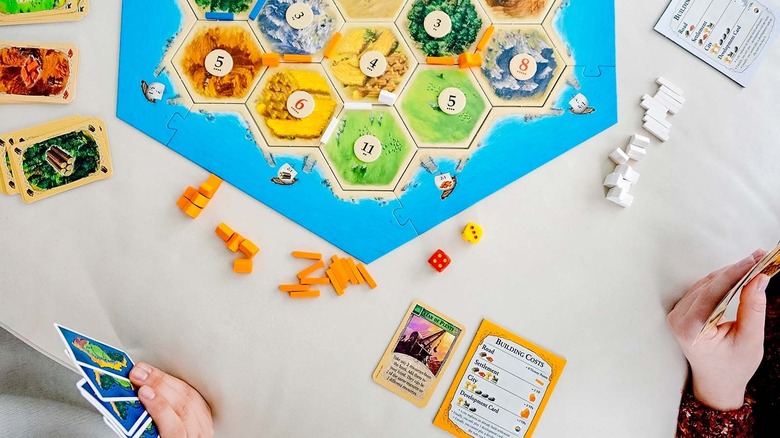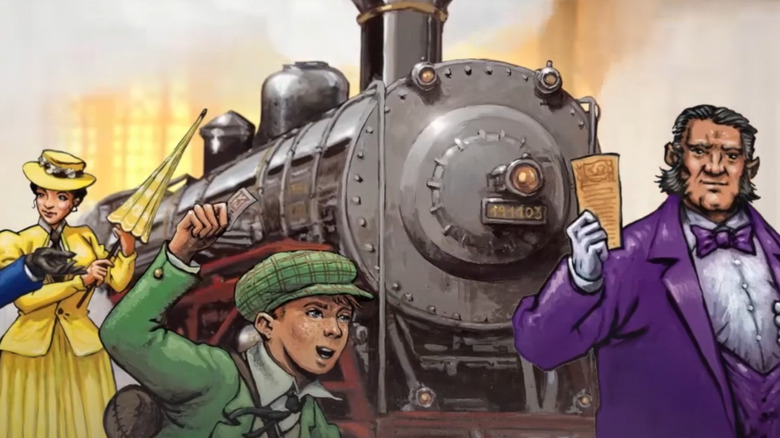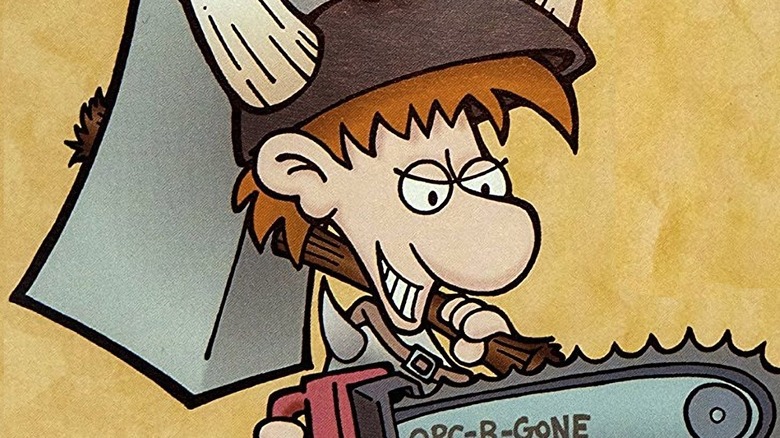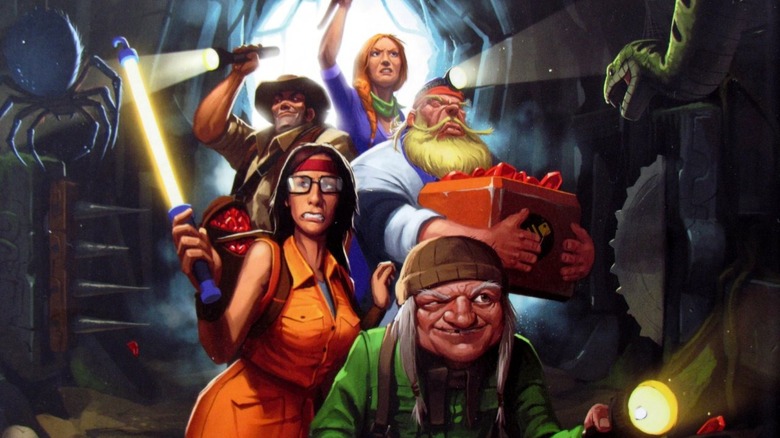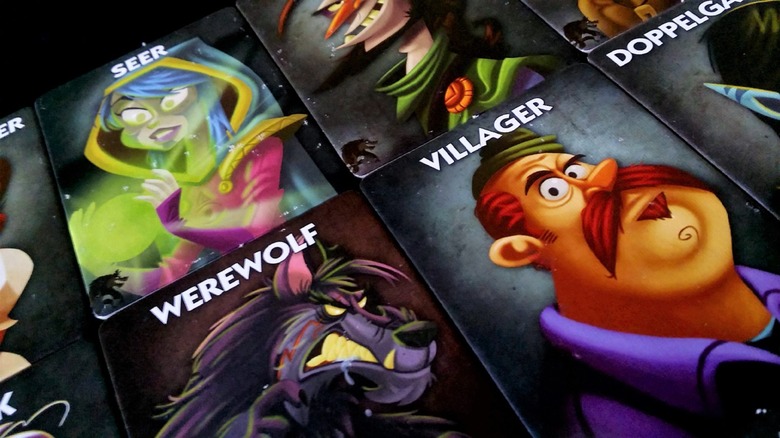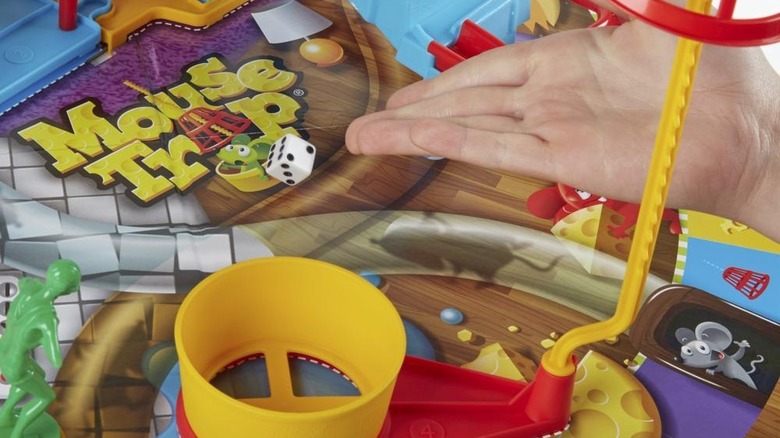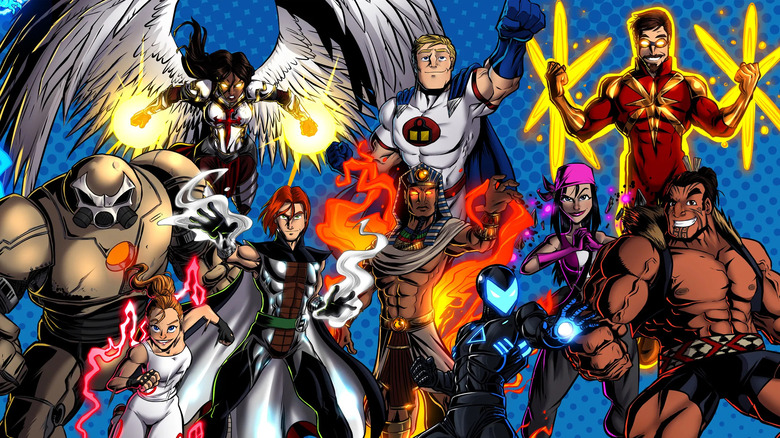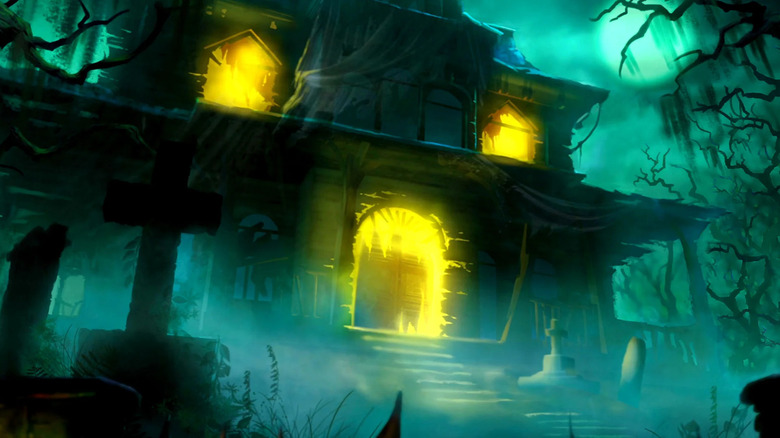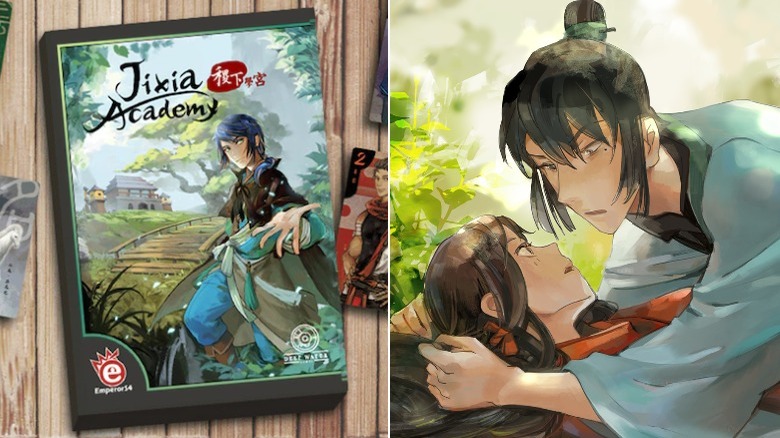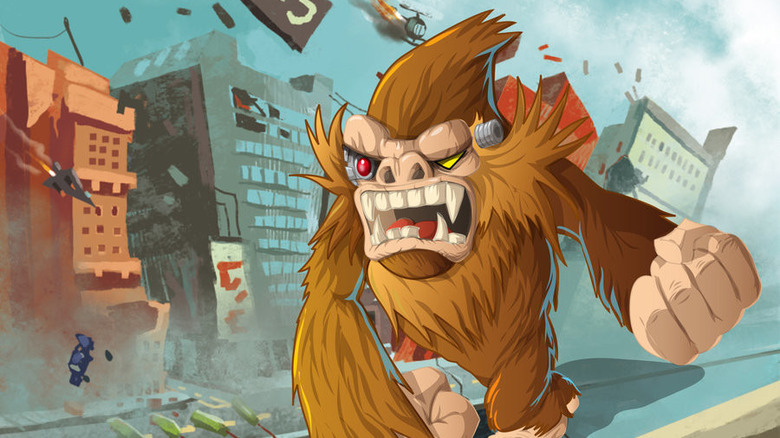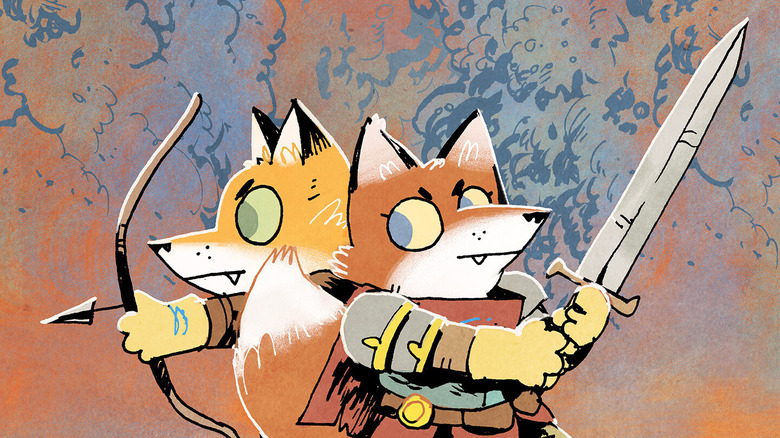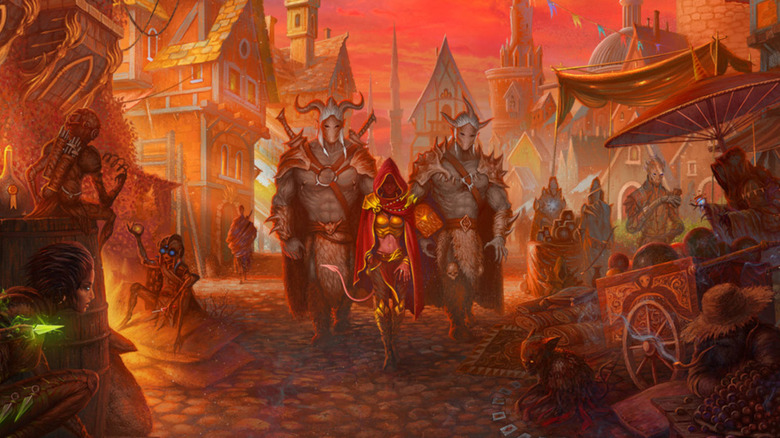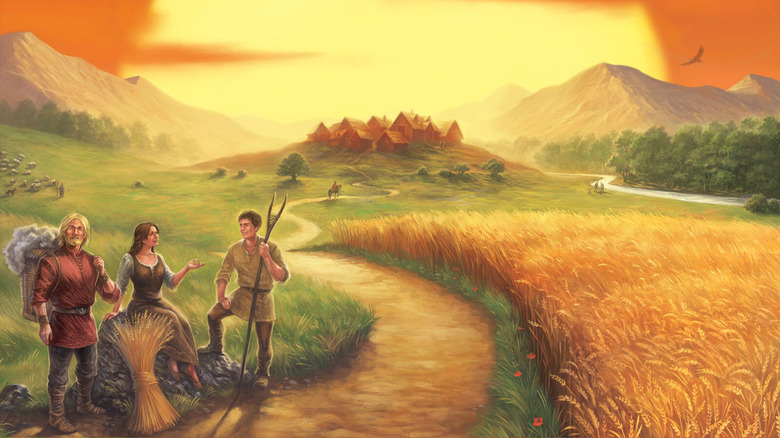15 Board Games That Would Actually Make Great Movies
Ever since Universal and Hasbro made a disastrous first impression with "Battleship," film fans have been quick to shoot down the notion that a board game could work as a movie. However, in an age where studios are desperate for movies with some kind of brand recognition, we've seen a resurgence in attempts. From "Monopoly" and "Hungry Hungry Hippos," to "Uno" and "Rock 'em Sock 'em Robots," it seems as though no tabletop pastime is safe from development hell.
These announcements, of course, sound ridiculous at face value. What story is there to be told in a game of "Uno," for example? There isn't one (at least not inherently) because the game has no narrative, but seasoned hobbyists will be quick to inform you that there are countless board games that are brimming with viable story concepts. From short excerpts in manuals to full role-playing experiences, a number of popular tabletop games take their lore very seriously, lore that could easily be woven and spun into a cinematic yarn. After all, it has worked in the past. Still don't believe us? Here are 15 board games that would actually make great movies, ranging from modern classics to more obscure fan favorites. From spy capers to horror anthologies, there's a little something for everyone in this lively collection. If you enjoy any of these pitches, consider going to your local games store and buying a copy for yourself.
Ticket to Ride
First published in 2004, Alan R. Moon's "Ticket to Ride" has become the premiere railway board game in households around the world. Tasked with traversing train routes across a country, players collect color-coordinated train cards to complete their assigned routes in exchange for points. In a film industry devoid of good ol' fashioned adventure films, this worldwide hit could easily translate into a cinematic, globe-trotting rat race with a variety of exciting train set-pieces. The manual even includes a charming origin story for the game's events, set during the same fictional timeline of Jules Verne's classic adventure novel "Around the World in 80 Days" (which has been adapted into a feature film three separate times).
It's October 2, 1900. Five friends have once again met up at a local London pub, as they do every year on this exact date. Inspired by Phileas Fogg's grand excursion, these old university mates began to take part in their own competitions. What began as a modest wager has grown into something much more excessive and things are about to get even bigger. The challenge this year? Travel, by train, to the most North American cities in one week's time. The prize? One million dollars. Grab five young and witty British talents (and incorporate the other characters from the box art, because why not), throw in a bit of healthy sabotage, and you've got yourself the potential for an action-adventure period piece. Not only could it satirize the vanity of the wealthy and boyish, but also highlight the importance of true friendship against all odds.
For fans of: "Around The World in 80 Days," "It's a Mad, Mad, Mad, Mad World," "Bullet Train"
Codenames
Another household mainstay, "Codenames" is a straightforward word game from Czech designer Vlaada Chvátil. Two duos face off as opposing spy factions looking to locate seven agents, each represented by a different word across a grid of 25 cards. Only using suggestive codewords, the spymaster must help their field operative properly identify their agents without accidentally steering them toward their opposing teams' agents, unbeknownst civilians, or a game-ending assassin. As "James Bond" sits dormant for the next few years, the world could use an extra spy caper or two. "Codenames" already has a sleek aesthetic harkening back to '60s espionage, so all you need is a little leeway in terms of story.
Two rival spy factions are left defenseless after an elite cell of cyber terrorists hacks into their mainframe. After they leak the locations of every undercover agent in their databases, each agency's top operatives — usually engaged in constant one-upmanship — are forced to work together. One group is made up of debonair, old-school attention hogs; the other, no-nonsense, covert go-getters. Wacky antics ensue as both teams must track down their fellow agents, each hidden under a pseudonym, before anyone else can. Little do they know that a mysterious assassin may be in their midst ... Balancing explosive shoot-outs with comedic banter from an elite cast of all-star comedians-turned-action stars, "Codenames" will satisfy both classic and modern spy film fans alike. It may even have a thing or two to say about how the Bond formula can adapt to the 21st century without losing its charm.
For fans of: "James Bond," "Mr. and Mrs. Smith," "The Man From U.N.C.L.E."
Munchkin
We're finally getting a proper "Dungeons & Dragons" movie early next year, which may leave the door open for fantasy that is ... less proper. Enter "Munchkin," the role-playing card game that's sick of the stats and skips to the fun stuff: kicking down doors, looting rooms, and fighting monsters. Funny spins on classic tropes await as players attempt to reach Level 10 without being screwed over by their competitors. Steve Jackson's irreverent pastiche is beloved by genre fans to this day (they just announced it will soon be going digital), largely because it's a series thoroughly in on its own jokes. The title itself is a slang term for the kind of player who refuses to lose, even if it means not playing fair. That very stereotype informs our story, centered on four adolescent boys who bond over their shared love of D&D. When a new kid — a hardcore D&D nerd — moves to town, he insists they let him DM their next campaign. Little do they know that his unorthodox play style, from absurd curses to made-up monsters, will put this group's friendships (and patience) to the test.
Outside of the game, talented child actors will portray the kids "Stranger Things" style. However, when the campaign is in session, our characters embody John Kovalic's iconic illustrations animated to the tune of Genndy Tartakovsky ("Star Wars: Clone Wars," "Primal"). Imagine fan-favorite cards, like the Kneepads of Allure or the Plutonium Dragon, brought to life with irreverent humor a la "Rick and Morty." Towing the line between silly and sadist, it would ultimately be a story about what games are really about: having fun.
For fans of: "Dungeons and Dragons," "Rick and Morty," the works of Genndy Tartakovsky
Incan Gold (Diamant)
The only push-your-luck game featured on this list, "Incan Gold" (internationally known as "Diamant") already has cinematic stakes built into its premise. Players take on the role of explorers entering an Incan temple, revealing a sequence of cards that either provide them with treasure or thrust them into danger. With every new card, players must determine whether they wish to leave the temple with the treasure they've accumulated — potentially with an artifact or two — or move further into the temple, risking everything. With upcoming sequels to both "Indiana Jones” and "National Treasure," the world wants more historical adventure movies, and this is the perfect excuse to resuscitate the genre. Set in the mid-1910s, five of the world's most decorated archeologists are hired by a wealthy preservationist to excavate an ancient Incan temple. He believes there are important Incan artifacts inside, as well as vast amounts of treasure. He allows the explorers to take whatever treasures they wish, so long as the relics are returned in one piece.
Some of them are eager to stuff their pockets, while others are more curious as to the rich history that lies within the ruins. However, many of the artifacts and treasures are tied to dangerous booby traps, and these savvy, intrepid adventurers must work together to continue through the temple, where even greater mysteries await. Spoiler alert: a few of these poor souls will not make it out alive. Jam-packed with genre staples, from mummy chases to mine cart races, "Incan Gold" is a story about the importance of preserving history in the face of greed and ignorance.
For fans of: "Indiana Jones," "National Treasure," "The Mummy"
One Night Ultimate Werewolf
In a world where "Hotel Transylvania" can get three sequels, we're in dire need of an original animated horror comedy to shake things up. Harkening back to family-friendly cult classics like "Monster House" and "ParaNorman," "One Night Ultimate Werewolf" would be an upbeat, hilarious romp without sacrificing a good scare for spooky season. In the game, players are secretly assigned roles and divided into two teams: the villagers (tasked with killing the werewolves) and the werewolves (trying to survive the night). After individually playing out special actions in silence during a night phase, players "wake up" and deduce each others' roles during a day phase. Players eventually vote on someone to kill, and the majority decision determines whether the villagers or the werewolves claim victory.
Designer Ted Alspach's reskinning of "Werewolf" is a unique, more fast-paced spin on the iconic social deduction game, but the real reason this version makes for the best movie is Gus Batts' illustrations. These kooky characters practically leap off the page (or card) and deserve quality voice actors bringing them to life, ideally animated in the style of Cartoon Saloon ("Wolfwalkers"). It's a horror whodunnit centered on a village that suspects foul play when residents begin dying in their homes each night. Bite marks suggest it was a werewolf, as legend says one resides in the surrounding woods. One devoted villager assembles a team to combat the threat, but allegiances grow murky as the enemy grows smarter. Could the werewolf be someone from the village? Agatha Christie meets R. L. Stine in a horror comedy about groupthink paranoia and its dire consequences.
For fans of: "Knives Out," "Wolfwalkers," "Werewolves Within"
Pandemic
"It's too soon," one might say, to put a "Pandemic" film into production following the real-life coronavirus pandemic, but was it ever too soon? Steven Soderbergh's "Contagion" skyrocketed in popularity during the early months of lockdown and recent films have already begun to reckon with the aftermath. Rather than make light of the lessons learned in the wake of COVID-19, this film would address the consequences head-on, presenting a cautionary tale for future generations. Matt Leacock's cooperative strategy game pits players up against four viruses discovered across the globe. Taking on individual roles with unique abilities, your team of specialists races against the clock to contain, treat, and discover a cure for these deadly diseases. Unlike many popular tabletop games, your team can lose the game under certain circumstances, including if an outbreak is not contained quickly enough. Life imitates art ... who'da thunk?
In an international co-production bringing together a wide range of global stars, "Pandemic" would follow several different characters who intersect as the world grapples with a deadly viral outbreak. These characters would, of course, take inspiration from the game's roles: one character is a Quarantine Specialist urging the government to respond appropriately, another is a Medic responding to cases on the ground level, and another is a Scientist who may have discovered a cure, etc. Taking a similar approach to ensemble disaster films like "Independence Day" and "Godzilla," this would be an epic interpersonal story channeled through the high stakes of "World War Z." It's not zombies, but let's just say this virus does more than take away your sense of taste.
For fans of: "Contagion," "World War Z," "The Leftovers"
Mouse Trap
There aren't many vintage games featured on this list, simply because most of them don't have a narrative leg to stand on. "Mouse Trap" certainly doesn't have one either, at least not at face value, but something about that crazy contraption at its center alludes to some cinematic potential. Everyone knows "Mouse Trap," the classic game in which players make their way across the board while collectively building a Rube Goldberg machine piece-by-piece. By the time players make it to the end of the board, it's a literal cat-and-mouse chase to see who will end up under the machine's trap net. Last mouse standing wins!
We'll take a page from everyone's favorite rat movie, "Ratatouille," and center the film on a colony of mice living in the attic of an ignorant elderly woman. After she passes away, a new couple moves in and is quick to spot a pest problem. They slowly begin taking out mice one by one with newer, more improved traps every time. When the couple leaves for a brief vacation, the mice take it upon themselves to leave traps of their own. By simply inverting the premise of the game and taking a few creative liberties, this retro board game (originally designed by Hank Kramer in 1963) takes on a whole new life. The film would combine the slapstick energy of "Tom & Jerry" with the satisfying comeuppance of "Home Alone," all incorporating the original contraption in ways both big and small. Expect appearances from a boot kicking a bucket, rickety stairs, a bathtub, and maybe even a flying man.
For fans of: "Home Alone," "Tom & Jerry," "Mouse Hunt"
Sentinels of the Multiverse
As fun as they may be, superhero movies are beginning to grow stale. Marvel and DC continue to compete, yet even their most classic characters feel overplayed. The genre is in dire need of some fresh faces and, luckily for us, there is an entirely untapped saga available right at our literal fingertips. "Sentinels of the Multiverse" is a cooperative card game featuring the heroes and villains of fictional comics publisher Sentinel Comics. Each player picks a different hero with their own deck of cards and combines forces against a villain card, both sides taking turns to exact damage in the hopes of depleting their opponents' health. Along the way, special powers can be used that may exact extra damage or even support fellow team members.
Since its release in 2011, "Sentinels" has inspired several expansions and even a role-playing game adaptation. All of this is possible thanks to the series' detailed, expansive lore, conceived by writer Christopher Badell and artist Adam Rebottaro. Our main characters are the "Freedom Five," led by Superman-Captain America hybrid Legacy, who take on a variety of villains in their quest to maintain peace within the multiverse. The universe of Sentinel Comics features several different characters, each with its own conceptualized run of comics interweaving countless multiversal timelines. Anyone who listens to Badell and Rebottaro's now long-running podcast knows how thoughtful they are about the world of Sentinel Comics and how, with the right management and creative vision, their humble card game could make for a franchise so epic it would make the MCU blush.
For fans of: The MCU, "Justice League" (animated series), "DC's Legends of Tomorrow"
Betrayal at House on the Hill
It was about time we injected horror into the mix. The genre sells like hotcakes, even in a pandemic, so why not capitalize on that? Both original and IP-based stories can thrive within the genre, so let's try something that meets in the middle. "Betrayal at House on the Hill," developed by Avalon Hill Games, may not be a household name but it holds a wealth of source material that will be appreciated by both horror fans and tabletop hobbyists alike. Players begin "Betrayal" as a group exploring a haunted house. After selecting their respective character cards, players traverse a three-floor house, building it tile-by-tile. It won't be long before a player triggers the Haunt phase, in which someone transforms into a Traitor, now bestowed with their own secret win condition. The remaining players are also given a secret win condition, and the true game commences.
This description may sound vague, but that's only because there are 50 different Haunt scenarios, each one triggered based on how your game has progressed. With a variety of different possible villains terrorizing our characters, "Betrayal" feels different every time you play. This suggests it would work best as a horror anthology reminiscent of "Tales From The Crypt," in which the House on the Hill acts as the setting for five distinct stories. Along with featuring "Betrayal" characters like Madame Zostra and Father Rhinehardt, it would also include elements of creature design a la Guillermo Del Toro. From mummies to banshees to straight-up poltergeists, practical efforts will help to elevate each vignette's frightening villain.
For fans of: "Tales From The Crypt," "Scary Stories To Tell in the Dark," "The Conjuring"
Jixia Academy
Easily the most obscure game on this list, "Jixia Academy" has a very unique history. Originally released under the name "Hanamikoji" (named after a well-known tourist street in Kyoto), Kota Nakayama's two-player card game had players attempting to win the favor of seven geishas. They do this by attempting to hold the majority of each geisha's cards by the end of the game. In 2019, Deep Water Games re-skinned "Hanamikoji" as "Jixia Academy." Now, instead of geishas, you are attempting to win the favor of male students at the titular school of philosophy, a fictionalized version of a real school that was established during China's Warring States period. What fans may not know is that this new direction was actually a tie-in to the crowdfunded Chinese dating simulator, "Dōngzhōu liè méng zhì," roughly translated as "Philosophic Love."
"Philosophic Love" follows a young girl who accidentally crosses the Qi state border and winds up in a small village filled with the aforementioned students, each one concerned with a different Chinese school of thought. She attends the Jixia Academy with them, engaging in flirty banter as well as deeper debate. As much as dating sims get a bad wrap, the film version would be a somber, romantic period drama about a Chinese woman's entry into philosophy. Through the lens of her relationships with these seven men, it's a slower, more arthouse approach compared to a lot of the films on this list. Imagine if Hong Sang-soo or Yasujirō Ozu made "Portrait of a Lady on Fire." It showcases the vast variety of cinematic potential within the tabletop medium.
For fans of: "Floating Weeds," "Portrait of a Lady on Fire," "Right Now, Wrong Then"
King of Tokyo
This one seems like a pretty simple equation: imagine every kaiju monster movie ever made and smush 'em together. That's the basic concept of "King of Tokyo," Richard Garfield's battle royale of epic proportions. Players pick one of several outrageous kaiju and engage in an all-out battle for Tokyo, attempting to damage their opponents and gain victory points in the process. Each turn is determined by matching dice combos after three consecutive rolls, as well as purchased cards that grant unique abilities. Unlike the "Monsterverse," which started off one monster at a time until their inevitable crossover, "King of Tokyo" gives us an opportunity to go all-out from minute one. We'll keep the story simple: Earth is being evacuated after scientists have deemed it uninhabitable (a distant future that's sadly all too near), but before the last ship can leave the planet, a cavalcade of gigantic monsters has begun to claim Earth as their own. As Tokyo becomes a battleground, they must find a way to escape the destruction.
Featuring iconic riffs on Mechagodzilla (Meca Dragon), the Kraken (Cthulu), aliens (Alienoid), and whatever the hell Cyber Bunny is supposed to be, "King of Tokyo" and its rampant pace of destruction will avoid the hulking slow-down seen in many of its competitors like "Pacific Rim." Add in a "King Kong" inspired subplot in which the humans befriend "The King," a giant cybernetic ape, and even our race can get in on the action. There really isn't a secret to the madness here, folks, just a dumb, fun, neon-lit monster movie that will push the genre to its limits.
For fans of: The Monsterverse, "War of the Worlds," "Rampage"
Root
War has come to the Woodland. In this asymmetric strategy game by Cole Wehrle of Leder Games, players lead one of four different factions. The Marquise, run by the power-hungry Marquise de Cat, have seized power over the forest once ruled by the Eyrie, who seek to regain control. Meanwhile, the Woodland Alliance has the remaining creatures of the woods joining forces, while the Vagabonds are free agents manipulating the system to their own mysterious benefit. "Root" can be a difficult game to wrap your head around. It only takes 30 victory points to win the game, but each faction executes unique tactics to get there. Each group scours the board, and may even skirmish, but everybody is playing by different rules. Despite this complexity, the game is a fan favorite within the tabletop community and sits in the Top 30 Overall ranking on BoardGameGeek. The game's loyal following has inspired several expansions, a 3D-animated video game, and even a role-playing game.
The success of "The Woman King" proves that we could use a few more historical war epics for this generation of moviegoers. An animated one may be a risky venture, but with this game's rich lore and hand-drawn aesthetic, it could find an audience. Combining the grounded tone of "Watership Down" with the expressive animation of "Wolfwalkers" (double dipping because Cartoon Saloon is just that good), "Root" is a war story with a "Rashomon" twist, examining four different perspectives in an ongoing war that has left a once-thriving forest dilapidated. Filled with breathtaking battle sequences and a sure-to-be-stellar voice cast, "Root" could prove animation's credibility as a medium not just for children but for adults too.
For fans of: "Watership Down," "Wolfwalkers," "Rashomon"
Coup
Political intrigue continues to be a cornerstone of popular television. From "House of Cards” to "Game of Thrones," we love watching corrupt individuals shift power dynamics. This translates perfectly into games of social deduction, and a strong string of political thrillers within the landscape of "Coup" may hold untapped potential. Developed in 2012 by Rikki Tahta, Sacha Alexander, and Haig Tahta, the game begins with players receiving two random cards, a secret combination of any of the five principal roles: Captain, Duke, Ambassador, Contessa, and Assassin. Each role allows for unique abilities, but players are allowed to lie about what roles they hold. Players can call out other players' bluffs, resulting in them losing roles, or they can amass seven tokens to execute a coup and automatically remove a role from a player's hand. The last player standing wins the day.
Though the political subplots of the "Star Wars" prequels get a lot of hate, that labyrinth of influence is a great reference point for "Coup," which would recreate the box art's futuristic/intergalactic aesthetic. The game's lore speaks of a corporatized government that has positioned a wealthy few in positions of absolute power. This inspires the creation of a resistance group that attempts to infiltrate the ranks, a pitch just in time for "Andor." "Coup" would see a wealth of characters, both within the government and largely outside of it, put their alliances to the test as they attempt to survive a society on the brink of revolt. Anyone could be conspiring with the resistance, and foreign aid can only get you so far.
For fans of: The "Star Wars" prequels, "House of Cards," "Cloud Atlas"
Gloomhaven
Dipping back into the world of role-playing, "Gloomhaven" sits second to "Dungeons & Dragons" as the ultimate tabletop RPG. Since receiving universal acclaim following its launch in 2016, it has sold hundreds of thousands of copies and holds the coveted #1 seat on BoardGameGeek's overall ranking. To this day, designer Isaac Childres' co-op experience continues to be a consistently sold-out, hotly sought-after board game. Set in a fantasy world of mercenaries and thieves, players choose among six starting classes and adventure through one of over 90 unique campaign scenarios. By crawling through dungeons, fighting enemies, and amassing experience and treasure, players make choices that will have a permanent effect on the story over several play sessions. It certainly isn't for the casual gamer, but it remains a modern classic for hobbyists thanks to its masterful design and detailed story world.
When reading through the game's flavor text, it's immediately clear that this is a story about duplicitous, opportunistic outcasts who are forced to work together to claim the bounty. If it wasn't already obvious, this has "Guardians of the Galaxy" written all over it (you even have a direct Rocket Raccoon corollary with the Vermlings), but channeled into the high fantasy aesthetic of "Lord of the Rings" with a touch of dark imagination a la "Pan's Labyrinth." Any of the game's scenarios would likely make for great action, but we would also weave in central themes of found family and redemption. It would likely be a bit more grounded than anything James Gunn has done in the past, but the tragic character backstories would be just as heartbreaking.
For fans of: "Guardians of the Galaxy," "Lord of the Rings," "Pan's Labyrinth"
Catan
Let's cap things off with an all-time classic in Klaus Teuber's "Catan," one of the highest-selling board games ever made. Previously titled "Settlers of Catan," players gain resources, build settlements, and expand their reach across the titular island. By slyly trading with other players, and hopefully avoiding the dastardly robber, players hope to win the game by earning 10 victory points. "Catan" was inspired by Teuber's passion for the Age of Discovery, a period of expansive sea travel (think Christopher Columbus). Teuber designed the game's mechanics and story to reflect the excitement of reaching new shores. However, in re-evaluating this history, we know Indigenous communities were ravaged as a result of European colonization. This film would be the perfect opportunity to right a number of these wrongs with a period story told through fresh eyes.
After a group of European sailors gets caught in a torrential storm, they are left shipwrecked on the fictional island of Catan, a utopia led by the indigenous Catanian people (think "Avatar" level visuals). Though things begin hostile, both sides agree to work together in cultivating Catan and its resources. Many sailors learn to respect the origins of the land and the traditions of its people, while others grow greedy and impatient. When infighting threatens the safety of Catan, the remaining sailors must take arms with the Catanian warriors to save the land they all cherish. It would take after historical dramas like "The New World" or "Dances With Wolves" but re-center their stories to honor Indigenous legacies. With a brand as ironclad as "Catan," even a board game movie adaptation could speak to the issues of today.
For fans of: "The New World," "Master and Commander," "Avatar"
